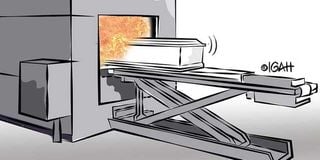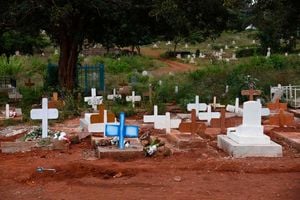
Often those who will prefer cremation tend to be the educated elites who should know the folly of such a decision.
Jesus said: “Let the dead bury their own dead” (Luke 9: 59- 60). This was in response to a disciple who wanted to spend time back at home before committing himself to Christ. The disciple wanted to honour and bury his father, but Jesus told him God’s work is more important than anything else.
The statement seems insensitive, but why would Jesus - the epitome of the virtuous ways for those of us who are Christians - say that?
Probably he wanted to bring home the message of the centrality of the living over the dead. That the dead should help the living prolong their lives.
That is the moral thing to do.
And this brings us to an important question. Those that die, what can they do to help the living? How can their mortal remains help make life easier for the living?
This is an important issue, particularly in a society where there is a new-fangled invention — cremation or burning into ashes of corpses.
Often those who will prefer cremation tend to be the educated elites who should know the folly of such a decision. As opposed to asking their will executioners to burn their remains into ashes, why can’t they will themselves into better and more humanistic use of their corpses like donating themselves for science in the university?
Medicine is one of the most important courses offered by the universities. The medicine course is about saving lives.
Cadavers
But every medical school must have cadavers - dead bodies intended for dissection. Without cadavers, there is no study of medicine. And without medicine, we will have no doctors to treat us.
Ask any dean of the school of medicine where they get these cadavers. Lots of drama.
Uganda happens to be the most popular source of cadavers.
This Uganda connection with cadavers has a historical basis. A popular story is told in medical classes regarding the first dean of medical school, Dr Joseph Mungai. Originally, immediately after independence, medicine in the entire Eastern Africa was only studied at Makerere University in Uganda. When the University of Nairobi started a medical school, the dean went to fetch Ugandan bodies. The border police flagged his car for inspection. They scampered on uncovering mortal remains packed inside the car boot.
Good cadavers, incidentally, are more available in Uganda for some tragic reasons. Northern Uganda has a history of conflicts. Some communities that reside there do not have a history of burying their dead. As a result, government officials pick those remains and preserve them in their mortuaries. The authorities are more than happy when Kenyan universities pick those unclaimed mortal remains as it frees their space.
Kenyans mortuaries have unclaimed mortal remains. But they tend to be highly mutilated. And there are legal blockages - Kenyan law calls for their disposal by local authorities. Kenya has about 12 medical schools. A student in first year should spend at least 250 hours dissecting cadavers. Each student should have a cadaver. In Kenya about 30 share a single cadaver.
Apart from cadavers, more benefits would be obtained if Kenyans donated their mortal remains to the universities as opposed to cremation.
One of the most important interventions by Social Health Authority (SHA) is in renal dialysis. It is a very costly affair that costs about Sh10,000 per session. A renal patient is required to undertake three sessions per week, hence Sh30,000. That translates to Sh120,000 per month. Majority depend on SHA contribution. It also induces anaemia hence other parallel interventions are needed, including dietary support.
Thousands of poor Kenyans are currently bearing the huge burden of renal dialysis. But, incidentally, it should not be an eternity exercise. On average, dialysis grants a patient a 10-year window. Dialysis should be a stop gap measure before a transplant.
But where does a poor Kenyan get an organ from? Either from a relative or mortal remains. But the cost of transplant is prohibitive. The transplant itself costs about Sh2 million. An increase in the availability of organs would definitely reduce the cost of transplants and save Kenyans’ lives.
Thousands of Kenyans are also becoming blind for lack of corneas. Corneas are easily available amongst mortal remains.
Of course there are strong reasons that dissuade Kenyans from donating their mortal remains for medical use.
The first is culture. People have an emotional connection with the dead.
Incidentally the burial culture is a very recent phenomenon in Africa. My Mount Kenya ancestors used to take the semi-dead to the forests. An ankle was called “that which hyena was unable to eat” since that was all that was left after decomposition and hyena feasting.
Burying is understandable under the current social norms. It is morally satisfying to check the burial site of a loved one.
But what moral purpose does cremation serve?
This lack of organs has very devastating effects. Apart from creating conditions for more to pass on like renal patients, it induces a black market that is hidden from authorities. Poor people are given money to donate their organs. Organised criminal gangs emerge when there is a huge demand for something that is illegal, like drugs, prostitution and organs.
Who knows, these rampant killings in our news could have something to do with this black market.
The government should make organ donation the legal default at death - you opt-out through a legal instrument like an affidavit if you do not desire to donate organs.
It can also consider banning cremation or taxing heavily those who desire cremation.
Because, as a country, we need to save lives.
And the dead can help the living to prolong their lives.
It is the moral thing to do. Than turning everything into ashes.
Dr Kang’ata is the governor for Murang’a County. [email protected].






